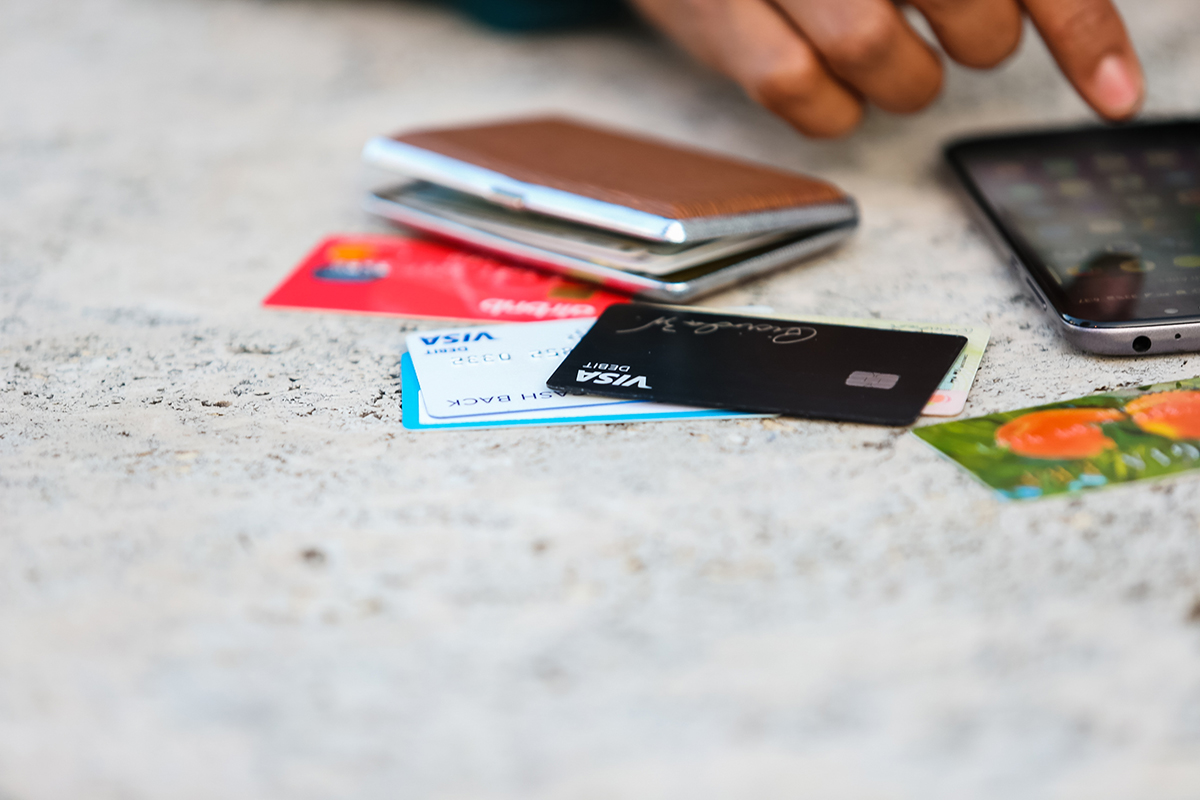In Denial About Your Finances? 8 Steps to Face Reality — Painlessly

Are your finances like the dirt and dust underneath your refrigerator? You know it’s ugly, but if you don’t actually look down there, it’s all good, right?
In both cases — your finances and your fridge — no, it’s not.
It’s time to take a deep breath, push past your financial denial and make some money moves that will make you proud of how your finances look. Here are nine ways to do that.
1. See Where You Stand

Like it or not, it’s time to open your eyes and take a look at your finances. How do you compare?
You don’t want to do as well as your friends and family financially… you want to do better. Status Money can help you see how you compare and help you create a plan to take your status from average to superstar.
Status Money is an app that allows you to anonymously compare your financial situation with your peers’ without asking those awkward, prying questions. Link an account to tap into this database, and you’ll be able to compare your income, debt, interest rates, credit score, spending… you name it.
By reviewing the information you provide, Status can help you find ways to reduce your interest rates for credit cards or loans. These and other financial tips can help you improve your status — fast.
By seeing how you stack up to others, you can see what you need to work on — why keep up with the Joneses when you can leave them in the dust?
2. Get to Know Your Credit Score

It’s time to get to know your credit score. Gulp! If you’ve been in denial and avoiding that three-digit number because, well, you might not want to know it, it’s time to step up.
Your credit score is important. The better your score, the better deal you’ll get on a mortgage, car loan or credit card. We’re talking big money, here. That’s why you need to quit ignoring it.
Even if you’re not buying a house anytime soon, a lousy credit score means you’ll get hit with a high security deposit whenever you rent a car or move into a new apartment.
But did you know your credit score could be inaccurate? One out of five credit reports have an error, according to a study by the Federal Trade Commission.
To keep a closer eye on your credit, get your credit score and a “credit report card” for free from Credit Sesame. It breaks down exactly what’s on your credit report in layman’s terms, how it affects your score and how to address it.
See? That wasn’t so hard, was it?
3. Give Your Retirement Savings a Little TLC

If you’re in denial about your current finances, your retirement savings are probably all but forgotten. If you’re saving for your retirement with a 401(k), awesome.
But when’s the last time you truly checked in on your account, adjusted your allocations, addressed any fees and all that other fun stuff? Come on. Step up and take a look.
Try using a robo-adviser to make sure your 401(k) is on track with your retirement goals. Blooom is an SEC-registered investment advisory firm that’ll optimize and monitor your 401(k) for you.
Your initial account checkup is free, and you can do it online in less than five minutes. This will help you get to know your account a little more intimately. Find out if you’re paying too many investment fees or if you have the appropriate amount of money invested in stocks versus bonds.
If you’re satisfied with the outcome of your initial check up, great! If not, you can enroll in Blooom for $10 a month (Penny Hoarders get one month free). It’ll automatically adjust your 401(k) to best fit your needs all the way up to retirement.
If you don’t have a 401k, it’s time to start saving for retirement right now.
4. Address Those High-Interest Credit Cards

When you are in financial denial, credit cards are like the monster under the bed. You just don’t want to look. But, like it or not, it’s time. You can slay that monster.
A lot of us are being crushed by credit card interest rates north of 20%. If you’re in that boat, consolidation and refinancing might be worth a look.
A good resource is consumer financial technology platform Fiona, which can help match you with the right personal loan to meet your needs.
Fiona searches the top online lenders to match you with a personalized loan offer in less than 60 seconds. Its platform can help you borrow up to $100,000 (no collateral needed) with fixed rates starting at 4.99% and terms from 24 to 84 months.
5. Create a Budget

Budget. There. We said it, and it wasn’t so bad, was it? OK, we know. Budgets are scary. Why? Because they make it hard, if not impossible, to stay in denial about your finances.
That’s actually a good thing. You can do this.
The first step is to find out how you’re doing now. Luckily, you can have a financial assistant right in your pocket to help you out.
The Empower app is a powerful budgeting tool that can help you figure out how you’re spending your money and develop a budgeting plan to keep you on track.
Link the app to your bank accounts, and it will track your spending. It will also categorize your spending so you can see exactly where you are overdoing it. That’s right: It will show you just how many times you went out for dinner because you didn’t want to do the dishes.
Set a monthly spending limit and the app will show you a graph that can tell you in one snapshot just how you’re doing for the month. Are you over the line or under it? It’s that simple to see how you’re doing so you can adjust your spending accordingly.
Sometimes a little accountability is all you need. Quit tweeting, and use your phone for something better, like finally learning how to budget.
6. Get Your Bills Under Control

Your bills are your bills, right? There’s no denying that. But what if your bills don’t have to be as big as they are? Ugh.
No one wants to spend a whole afternoon on the phone with the cable company. That’s enough to make anyone crawl up into the fetal position on the couch. We found a better way to knock your bills down to size.
Download TrueBill, an app that’ll negotiate your bills, cancel unwanted subscriptions and refund your bank fees.
After downloading the app, create an account and link your bank account and/or credit cards. Turn on the bill negotiation and outage protection features. Boom. TrueBill is already searching for potential refunds — it might get you a refund even when you didn’t know an outage occurred.
On average, Truebill says it helps customers save more than $700 a year by lowering their bills, canceling necessary subscriptions and getting refunds.
The app will also remind you of all those sneaky subscriptions you’ve signed up for through the years, so you can cancel what you don’t use and reclaim your monthly budget.
7. Start an Emergency Fund

You car breaking down? You don’t want to think about it. Emergency medical or dental bills? Nope. You’d rather assume the best than prepare for the worst.
This kind of financial denial can really put your finances in a bind, for the short term and for years to come. You may not want to think about financial emergencies, but they happen. It’s time you started preparing for it with a simple emergency savings account.
An iOS app called Varo Money combines traditional banking tools with modern technology to help its customers become financially healthy.
Here’s the best part: Pair your Bank Account with a Varo Savings Account where you’ll earn 1.75% Annual Percentage Yield. That’s nearly 30 times — repeat, 30 times — the average savings account, based on a 0.06% average reported by CNN Money.
Now, just make sure you save enough to survive a financial emergency. That’s the point, right?
8. Get a Banking App That Keeps You on Your Game

If seeing your checking account statement each month is a horror story of forgotten debit card charges, we found the app that refuses to let you neglect your finances.
Chime® is an online-only banking app that offers some unique features other banks haven’t caught on to yet. It sends you instant transaction alerts that tell you how much you just spent and your new balance.
No need to log in just to see where your account stands. App notifications let you know with every swipe of the card or automatic withdrawal.
Plus, Chime doesn’t charge overdraft fees, monthly maintenance fees, foreign transaction fees or minimum balance fees. Its mobile app boasts more than 2,000 five-star reviews, making managing money super accessible via iPhone or Android.
Opening an account is free and only takes about five minutes.
Breathe Easier
There. You did it. One quick afternoon and your finances are in a much, much better place.
Denial is an ugly thing that makes the things we fear appear even worse than they actually are. Step up, face your finances and get ready for a better future.
Now, go clean under your refrigerator. Seriously. Yuck!
Tyler Omoth is a senior writer at The Penny Hoarder who loves soaking up the sun and finding creative ways to help others. He was in deep financial denial for years, though he’s now in denial about that. Catch him on Twitter at @Tyomoth.


















